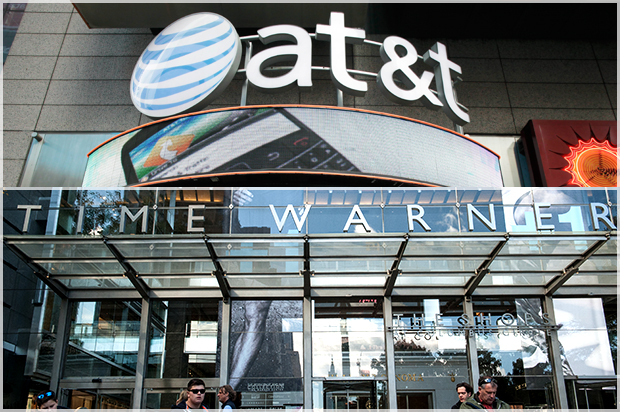This 2016 year has played out like a game of Dystopia Bingo. A presidential candidate from a major party who is terrifyingly blasé about the use of nuclear weapons and who might not even accept a democratic verdict against him? Check.
Man-made climate change passing the proverbial point of no return (while no one seems to care)? Done.
Discovery that a self-proclaimed freedom fighter like Julian Assange has become a pawn of Vladimir Putin? Enough!
Yet here we are facing yet another disturbing development. Less than 40 years after AT&T’s communications monopoly was smashed to bits by the government, the corporate giant is now planning to acquire Time Warner for $85.4 billion. In any other year, this would easily be the most dispiriting development. But this is 2016, so it just means we’re one metaphorical square away from shouting, “bingo!” and being done with it all.
Here are five reasons why this mega-merger should worry you:
1. Telecommunications companies are entering the entertainment business.
It’s a well-known fact that the digital era’s new media companies — Amazon, Netflix, Google — are starting to develop their own telecommunications infrastructure and creating their own original entertainment content. Now that trend is coming full circle. By purchasing Time Warner, AT&T, which already has the infrastructure, would now own HBO, TBS, TNT, Warner Brothers, and the Cartoon Network, as well as a healthy chunk of live sports broadcasts and a 24-hour news venue (CNN).
2. It’s yet another blow to net neutrality.
It should go without saying that a service provider that also creates content might use the former activities to steer consumers in the direction of the latter. And well, that is absolutely the concern that critics have of AT&T’s purchasing of Time Warner. For instance, if AT&T decides to zero rate content from its providers — that is, allow users to access it without increasing their data usage — this could give them a clear advantage over potential competition.
3. It sets a toxic precedent for establishing monopolies.
Yes, the Senate’s antitrust subcommittee is investigating the AT&T-Time Warner acquisition. Don’t be too optimistic about the fact that two companies, which spent millions in campaign contributions, are going to allow Congress to tank their monster deal or, for that matter, that they didn’t carefully anticipate Washington’s reaction before going ahead with it.
The days of Teddy Roosevelt’s trustbusting are over. Politicians and corporate leaders know that most Americans don’t care about monopolies. So once the initial shock of this announcement wears off, it could set a precedent that other conglomerates follow.
4. We’ve seen this when Comcast purchased NBC in 2011.
Although the FCC required Comcast to agree to 150 conditions in order to purchase NBC, including provisions to protect net neutrality and prevent the stifling of competition, the complexity of the deal makes it all but impossible for potential claimants to effectively sue the corporation.
“The lessons from Comcast/NBC are that it’s hard to enforce any behavioral conditions, ever, especially in timely fashion,” explained Matt Wood, policy director at the public interest group Free Press, in an interview with Fortune. “A remedy isn’t worth much to a competitor if it takes years in court and millions of dollars in legal fees to get it.”
5. And as the surest sign of the apocalypse, Donald Trump might actually be right about something.
Republican presidential nominee Trump’s quote speaks for itself: “As an example of the power structure I’m fighting, AT&T is buying Time Warner and thus CNN, a deal we will not approve in my administration because it’s too much concentration of power in the hands of too few.”


